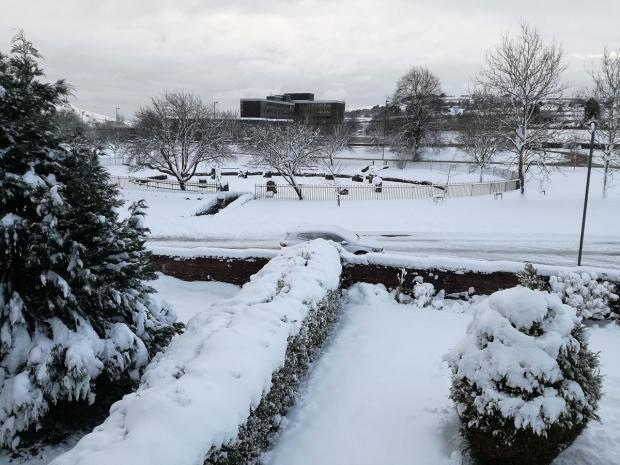
A PARTNERSHIP between news outlets across the UK, the Local Democracy Reporting Service, celebrated its first birthday this week. Funded by the BBC, the scheme has seen Local Democracy Reporters (LDRs) file nearly 50,000 stories providing impartial coverage of local councils and public bodies on behalf of 100 media organisations. One of the LDRs assigned to the South Wales Argus, NIALL GRIFFITHS, reflects on the importance of the post he has held since last March.
I REMEMBER the first meeting I covered as an LDR involved an authority which had received patchy coverage in recent years.
I walked into the press box and as the door slammed shut, the head of every councillor and officer in the room slowly swivelled round to stare at me as if I was from another planet.
The meeting involved the significant six-figure overspends on winter maintenance on the back of the so-called ‘Beast from the East’.
 Ebbw Vale covered in the snow last March
Ebbw Vale covered in the snow last March
This itself was a story but other lines came to light at the meeting - facts and figures shared verbally by officers that weren’t in the report. This gave me the chance to build up a bigger picture of how badly the snow impacted other councils.
At the end of the meeting the chair of the committee thanked members for their attendance, but also turned to thank me for being there.
The role has allowed me to shine a light on some of the biggest issues facing authorities in Gwent, including homelessness, pressures on social services, the rollout of Universal Credit and rising demand for housing.
I've also been able to report on heated debates on hot button issues such as begging in Newport city centre, a controversial revamp of leisure services and the ongoing pay dispute involving Caerphilly council.
Issues involving other authorities such as Gwent Police and the South Wales Fire and Rescue Service have also benefited from coverage as part of the LDR scheme.
Without scrutinising these reports or attending these meetings, most of these things would have gone unreported. LDRs have been enlisted to address this exact issue.
I have found that councillors welcome the increased scrutiny and presence of the local press at meetings, though some still seem surprised that I'm there.
 Gwent council leaders: (Top, L-R) Cllr Debbie Wilcox, Newport, and Cllr Anthony Hunt, Torfaen. (Bottom L-R) Cllr David Poole, Caerphilly, Cllr Peter Fox, Monmouthshire, and Cllr Nigel Daniels, Blaenau Gwent
Gwent council leaders: (Top, L-R) Cllr Debbie Wilcox, Newport, and Cllr Anthony Hunt, Torfaen. (Bottom L-R) Cllr David Poole, Caerphilly, Cllr Peter Fox, Monmouthshire, and Cllr Nigel Daniels, Blaenau Gwent
Reporters were once a part of the furniture at council meetings but in recent years some organisations have struggled to spare a reporter to send to meetings which could stretch on for hours.
This is has allowed decisions to go largely unchecked. It is crucial that council decisions are scrutinised, and that its members are held to account.
Councils put out some information out through their own channels, but as LDRs – and journalists generally– it is our duty to dig deeper and tease out other aspects that may be of interest to the public.
People want to know how much their council tax is going up, or if the public services they rely on will still be there in a few months’ time.
March will mark a year in the LDR role for me. I feel the appetite for council coverage has grown on my patch since then, and in local authority areas across the UK.
I think it is heartening to see competing media outlets working together to plug a gap in local reporting that only threatened to grow.


Comments: Our rules
We want our comments to be a lively and valuable part of our community - a place where readers can debate and engage with the most important local issues. The ability to comment on our stories is a privilege, not a right, however, and that privilege may be withdrawn if it is abused or misused.
Please report any comments that break our rules.
Read the rules here